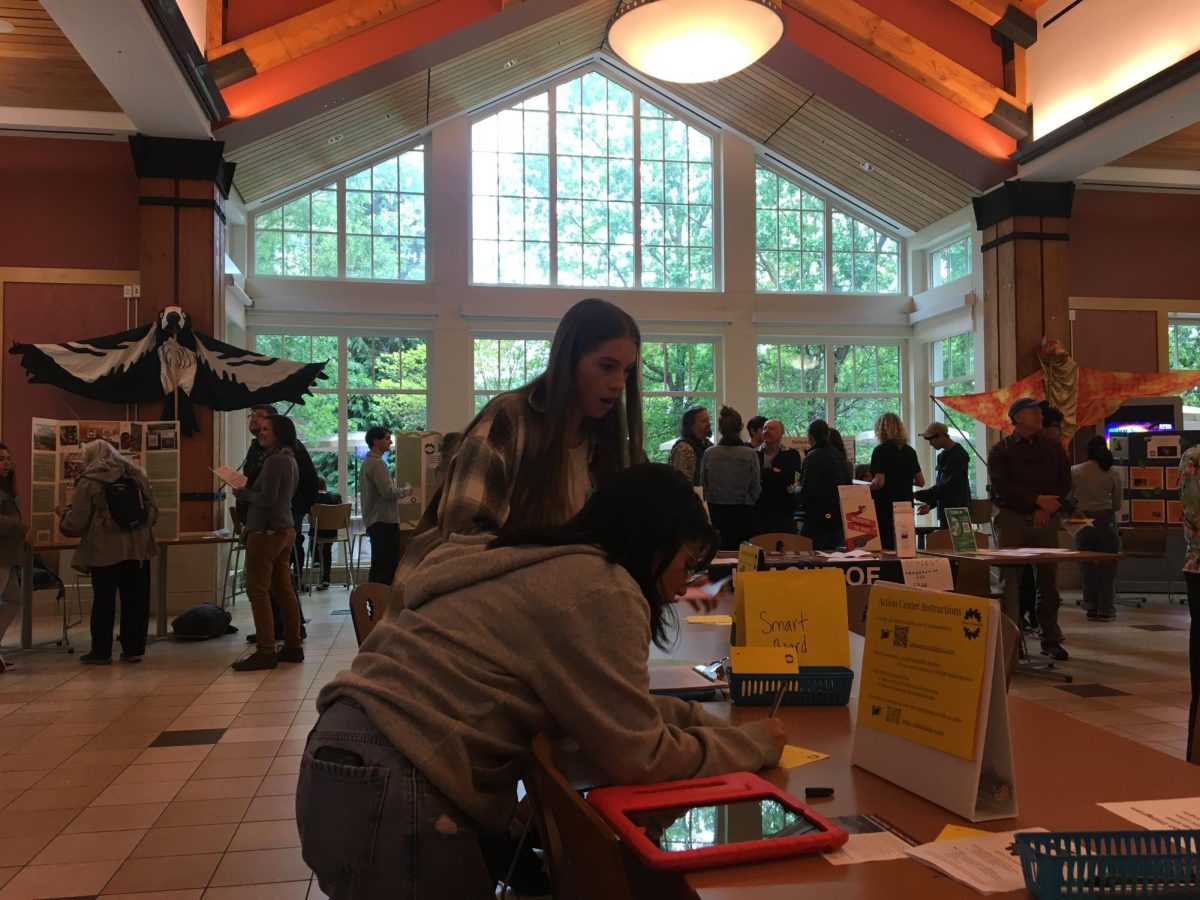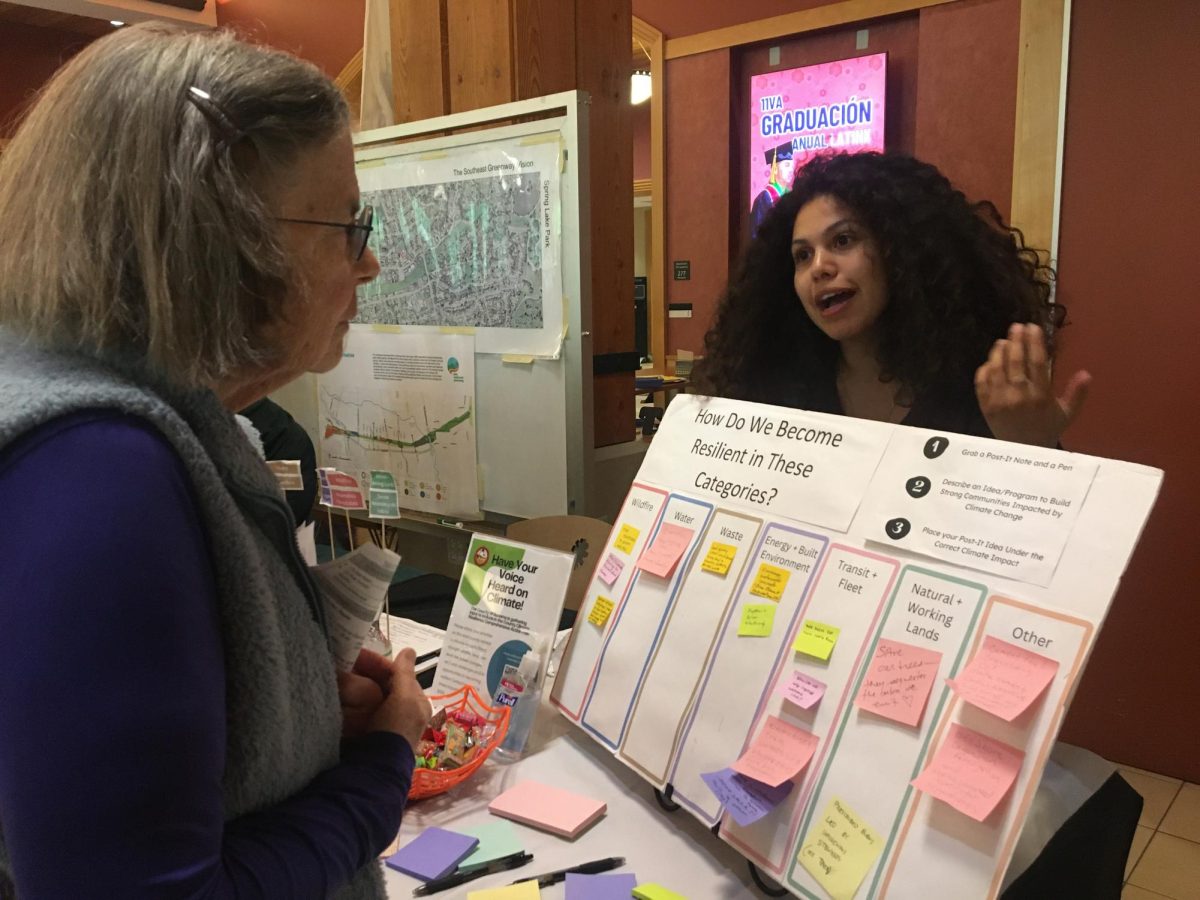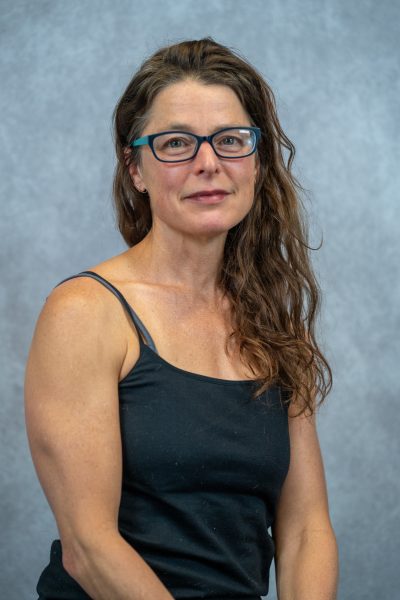At three minutes after 5 p.m. the atrium in Bertolini Hall hummed with the voices of students, faculty and community members united by their passion for climate solutions.
Climate Action Night had just begun but already over 100 people were sharing their knowledge and eagerness to come together to effect change. Dozens of tables lined the perimeter of the room and, at each table, Santa Rosa Junior College, Sonoma State University and local high school students presented their posters displaying research on proposed bills on the ballot in 2024. Attendees clustered at tables, leaning in to hear the presentations and the hum rose to a congenial buzz as more and more people arrived. This collective of students, along with faculty, high school teachers and community activists, organized the event to make direct political action for climate protection easy and inspiring at Climate Action Night on April 25, 2024, in Bertolini Hall at the SRJC Santa Rosa campus.
Greeters from the SRJC Biology Club handed new arrivals a Climate Action Night 2024 passport, which directed them to learn about proposed bills and local climate solutions and, most importantly, to take action. Inside the passport were summaries of the 14 proposed bills before the California Assembly or Senate and four local climate actions promoting green power and transportation, improving bike and walking routes, and campaigning for farmworker hazard pay. Greeters encouraged everyone to collect a stamp from each of the presenters to earn a small reward. They offered tablets for scanning QR codes and sent people out to explore the wide variety of presentations.
In the center of the room stretched two long tables with piles of blank postcards and jars of pens at the ready: the Action Center. A sign and roving students provided explicit instructions to make activism accessible. Step one: find your representative with the QR code. Next: write three postcards, one to your assembly member, one to your senator and one to SMART board members. Step three: sign letters of support for two of the community projects (described above). And four: register to vote.
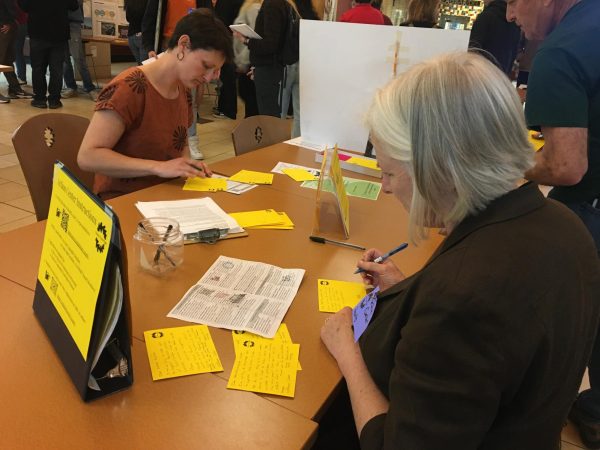
And people responded to the straightforward and actionable instructions. Student presenters stamped hundreds of passports, community activists gathered hundreds of postcards and students talked themselves hoarse over the buzzing excitement of over 240 impassioned climate activists.
Student groups stood by their posters, readily engaging attendees with explanations of the bills they represented. The bills ranged from subsidizing electric vehicles for low-income drivers, to regulating oil and gas companies and holding them liable for causing health problems, to promoting healthy soils and expanding bike and pedestrian trails.
Jimena Santos, a sophomore at Roseland University Prep, encouraged attendees to write postcards to ask the SMART Board of Directors to reopen the Jennings Crossing near Coddingtown Mall, which was closed when the SMART train line was built. Elizabeth Riddlington, of Santa Rosa, represented Bikeable Santa Rosa and mentored students to teach them about the closed Jennings Crossing and help them prepare their presentations. “These kids were born in 2008, the year voters approved construction of the SMART line and bike path,” she said. “They don’t particularly care about cycling, have never engaged in political activism before, but as they learn more they see that it’s a problem that they want to fix. And now they see that they can have an impact.”
Marcello Cattaneo, a senior in sociology at SSU, taught attendees about proposed State Bill 1137 that would hold oil and gas companies accountable for health problems in vulnerable communities neighboring oil and gas wells. The bill also proposes incentives for oil companies to use the ‘best available technology’ to reduce air pollution.
Cattaneo handled tough questions from attendees who wanted to know how companies’ liability would be determined or precisely how ‘best available technology’ was defined. He admitted that he had not been able to find a precise definition of what that technology is, other than “it may differ for each company.” When attendees pressed him about the bill’s limitations, he acknowledged that “this bill is like a bridge until we can work towards [something] better.”
In terms of companies’ liability, Cattaneo clearly explained that residents had to have lived within a one-kilometer safety zone surrounding the drilling and wells for at least two years before being diagnosed with a contaminant-related illness like cancer. Even then, companies could challenge diagnoses and take the case to court, he explained.
Glen Brassington, a senior at Orchard View School, presented on methods oil and gas companies use to undermine laws previously passed. State Bill 1137 was passed in 2022 to block companies from building wells within 3,200 feet of schools, residences, childcare facilities and playgrounds, he explained. It passed with overwhelming bipartisan support.
A reasonable voter may wonder why this bill will be on the ballot again. Brassington explained that oil companies recently got enough signatures to put it on a referendum to be removed. “So in this election cycle, there’ll be a question of do you want to keep this bill or do you want to remove it?” he said.
“There are companies that you can pay per signature, so they’ll go out to communities and they’ll say, ‘Hey, do you want to sign this petition to get cheaper gas prices?’ when it’s actually not true. So [the oil and gas companies] got enough signatures to put this referendum on the ballot that’s going to ask you whether to keep or remove the bill,” Brassington said. It’s understandable that Californians may want to lower gas prices, but at what costs to the vulnerable communities living near drillings and wells?
Brassington may be young, but he faces his future with eyes wide open. His voice broke when he said, “Climate change is a really pressing concern. And it’s one of the biggest threats to our planet. If it’s not tackled, there won’t be much of a planet for us to live on afterwards. So yeah, I have to do something in order to help tackle it, because many other people aren’t going to do anything.”
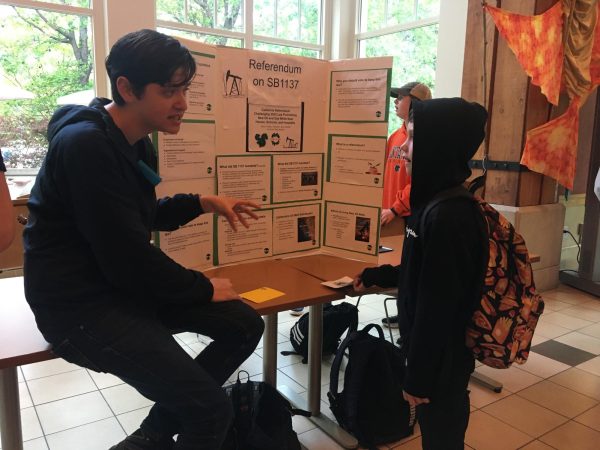
Summer Swallow, a former SRJC student and current environmental educator at Pepperwood Preserve, roved around the hall asking students tough questions. Students presenting about textile recycling said the proposed law would require companies to create more durable clothing. Swallow asked the students what specific kinds of materials companies would switch to, and in response they said, “Hopefully organic ones and less polyester and plastic-based.”
Paula Fogerty, retired Montgomery High School biology teacher, admitted to activism fatigue. “It’s discouraging when you’re frantically writing to one committee, [to learn that it’s being repealed],” she said. But she found the evening interesting and students taught her about bills that had not been on her radar. “It’s super. The more young people who get more politically smart, the better off we are.”
Zola Ruiz, a community member and SRJC biology student, has been involved in community activism since high school. The students’ dedication, focus and excitement inspired him. “There’s so much doom and gloom in the news and on the internet. It’s so nice to see a shining light of positivity,” he said. “It’s rejuvenating.”
The hard work of activism requires engaging potentially disinterested individuals to turn their attention to problems they may prefer to ignore. Hattie Lewis, a sociology junior at SSU, found this the most challenging aspect of her participation in the event. “I’m kind of shy and a little bit more reserved. So it was kind of awkward going up to people and initiating something,” she said. But, overall, she enjoyed the experience and says she would do it again.
Event co-chairs Abigail Zoger, SRJC earth and sciences faculty, and Sunny Galbraith, Orchard View School biology teacher, glowed from the evening’s achievement. Over 240 attendees submitted more than 400 postcards, Zoger reported by email after the event. To cap off the event, students handed the postcards to assembly member Jim Wood and to the staffers in the offices of state senator Mike McGuire and assembly member Damon Connolly Friday.
Follow @climateactionnight on Instagram to keep up with climate activism.



